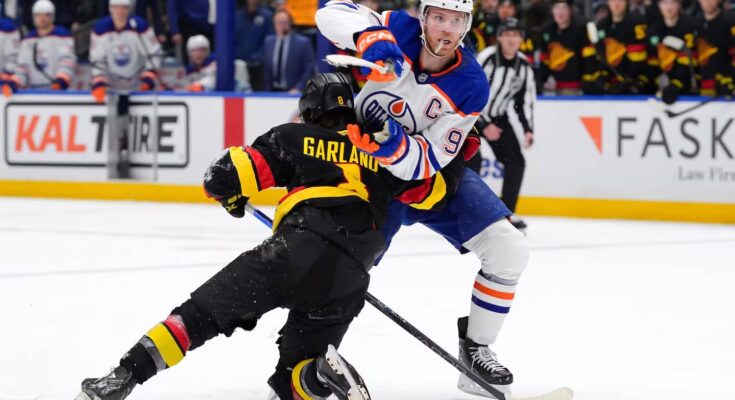Breaking News: Connor McDavid Suspended Three Games for Cross-Checking Conor Garland — A Deep Dive into the Incident and Its Ramifications
In a stunning announcement that has sent ripples throughout the NHL community, the league’s Player Safety department has handed down a three-game suspension to Edmonton Oilers captain Connor McDavid for cross-checking Vancouver Canucks forward Conor Garland. This disciplinary action marks a rare moment of controversy surrounding one of hockey’s brightest stars and raises important questions about discipline, player safety, and the future dynamics of the Oilers’ lineup.
The controversial play occurred during a heated contest between the Edmonton Oilers and the Vancouver Canucks, a matchup already brimming with intensity and playoff implications. Late in the third period, with the game’s momentum swinging back and forth, Connor McDavid and Conor Garland found themselves in close proximity near the boards. In an attempt to gain positional advantage, McDavid delivered a cross-check to Garland’s upper body, a move deemed excessive by officials upon video review.
The force of the cross-check visibly affected Garland, who was seen reacting in pain immediately following the impact. The referees initially assessed a minor penalty, but following a detailed review and subsequent consultation with the NHL’s Department of Player Safety, the league decided to impose a more serious punishment, culminating in McDavid’s three-game suspension.
A cross-check, by NHL rules, occurs when a player uses the shaft of the stick between two hands to forcefully check an opponent. While physicality is a core element of hockey, cross-checking can lead to dangerous injuries, especially when targeted at vulnerable areas such as the head, neck, or back.
In McDavid’s case, the cross-check was judged to have crossed the line from a routine physical play into a reckless act endangering Garland’s safety. The NHL has been increasingly vigilant in recent years about protecting players from dangerous hits and hits to the head, and McDavid’s suspension aligns with this ongoing priority.
Connor McDavid isn’t just any player. He’s widely regarded as one of the best, if not the best, hockey player in the world. As the Oilers’ captain and offensive powerhouse, McDavid is the driving force behind Edmonton’s scoring, playmaking, and overall success. His absence for three games is a significant blow to the team’s prospects, especially if these games come during a critical stretch of the season.
From a strategic standpoint, the Oilers will need to adjust their lines, redistribute responsibilities, and find ways to compensate for the loss of McDavid’s creativity and leadership. Other players will be expected to step up and fill the void, but replacing a talent of McDavid’s caliber is a nearly impossible task.
It’s worth noting that suspensions for elite players, particularly those of McDavid’s stature, are relatively uncommon. The NHL tends to weigh the impact of disciplinary actions carefully, balancing deterrence of dangerous plays with the overall health of the league’s entertainment value and competitive balance.
In the past, other stars like Sidney Crosby, Alexander Ovechkin, and Patrick Kane have faced suspensions, but often for more severe infractions or repeated offenses. McDavid’s three-game suspension reflects both the seriousness of the infraction and the league’s commitment to player safety.
The response to the suspension has been swift and divided:
- Edmonton Oilers Organization: The Oilers expressed disappointment but emphasized respect for the league’s decision. GM Ken Holland stated, “Connor is a competitive player who plays the game hard but within the rules. We support him as he serves this suspension and look forward to his return.”
- Connor McDavid: McDavid released a public statement apologizing for the incident, stating, “It was never my intention to hurt Conor Garland. I respect all players in this league, and I take full responsibility for my actions.”
- Vancouver Canucks and Conor Garland: Garland, who was visibly shaken during the game, thanked the league for taking action. He added, “It’s important that players feel safe on the ice. I’m grateful for the support from my team and fans.”
- Fans and Media: Social media erupted with debates, some arguing the suspension was justified to maintain player safety, while others claimed it was too harsh given McDavid’s usually clean playstyle.
This suspension underscores the NHL’s ongoing effort to clamp down on dangerous plays and send a clear message that even the game’s biggest stars are not above the rules. In recent years, the league has increasingly used video review, stricter penalties, and suspensions to reduce injuries related to hits to the head, cross-checking, and other forms of illegal physical contact.
By suspending McDavid, the league reinforces its stance that player safety is paramount, regardless of a player’s fame or importance to their team. This could serve as a precedent for future disciplinary actions and might influence player behavior league-wide.
The Oilers face a crucial period without their captain. The three games McDavid will miss could impact their standings and playoff positioning, especially if they face tough opponents during this stretch. Coach Jay Woodcroft will have to rely heavily on other core players like Leon Draisaitl, Evander Kane, and Kailer Yamamoto to shoulder more responsibility offensively and defensively.
The suspension might also change the team’s style of play temporarily, perhaps prompting a more conservative approach to avoid further penalties or suspensions.
While this suspension marks a rare blemish on McDavid’s otherwise stellar career, it’s unlikely to define him. McDavid has consistently been known for his skill, sportsmanship, and leadership. However, it serves as a reminder that even the best players can sometimes cross lines and face consequences.
Long term, this incident might encourage McDavid to refine his physical play and maintain his status not only as a top scorer but also as a role model on the ice.
The NHL’s rules around cross-checking are designed to maintain balance between physical play and player safety. According to Rule 59 of the NHL rulebook, cross-checking occurs when a player uses their stick with two hands to forcefully check an opponent.
Penalties for cross-checking range from minor to major penalties and can include game misconducts or suspensions depending on the severity and intent. The Player Safety department considers factors such as injury to the opponent, the player’s disciplinary history, and the nature of the hit when deciding on suspensions.
In McDavid’s case, the suspension indicates that the cross-check was viewed as reckless enough to warrant a multi-game ban, suggesting significant force or impact.
Suspensions are not everyday occurrences in the NHL, especially multi-game bans. According to recent league data, there are generally between 10 and 20 suspensions each season, with most lasting one or two games.
Three-game suspensions are less frequent and typically indicate a more serious infraction or repeat offenses. For a player like McDavid, known more for finesse and speed rather than physicality, this suspension is particularly notable.
Depending on when these three games fall, the Oilers could face challenges maintaining momentum. Losing McDavid, who often influences the game’s pace and scoring chances, could reduce Edmonton’s offensive threat.
If the suspension overlaps with key divisional matchups or playoff-clinching games, the team might find itself at a disadvantage. Conversely, it could provide an opportunity for other players to emerge and demonstrate leadership and scoring ability.
The NHL Player Safety department, led by Brendan Shanahan, is responsible for reviewing plays and issuing disciplinary actions to promote fair play and reduce injuries. They utilize video evidence, input from referees, and medical reports when making decisions.
This suspension shows their continued commitment to holding players accountable regardless of star status. Shanahan’s department often faces criticism both for being too lenient or too harsh, but in this case, the suspension appears to reflect a balance between deterrence and fairness.
Many fans and analysts argue that suspending McDavid sends a clear message that the NHL is serious about protecting players. Given Garland’s injury and the clear physicality of the cross-check, some see the suspension as overdue.
Others feel the suspension is too severe, citing McDavid’s history of clean play and the intensity of the game’s physical nature. Some suggest the league should differentiate between intentional harm and a competitive edge.
After serving the suspension, McDavid will be eager to return and help his team rebound. The Oilers will likely focus on reintegrating him smoothly and ensuring he maintains discipline to avoid further issues.
The suspension might also spark internal team discussions on physical play boundaries and self-regulation during games to avoid future penalties.
Connor McDavid’s three-game suspension for cross-checking Conor Garland is a significant moment in the NHL season. It reflects the league’s growing emphasis on player safety, highlights the consequences of crossing the line even for elite players, and presents a challenge for the Oilers moving forward.
As the NHL continues to evolve, balancing physicality with safety will remain a priority, and this suspension serves as a reminder that all players, regardless of talent or status, are held to the same standards on the ice.



